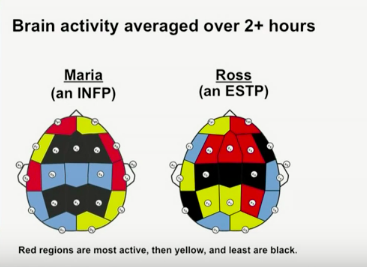1. Your functions’ percentages show how often you use them

There are many free online MBTI tests out there and some of them, such as from 16personalities.com, offer results in percentage. So you may get something like 30% Thinking – 70% Feeling, 49% Intuition – 51% Sensing, etc.
So does the test mean you use your feeling about 70% of the time and thinking the rest? The answer is: that is not how thing works. I would say showing a percentage scale is misleading to the audience. Whether you are 90% or 51% feeling, you are still a feeling type.
Your thinking and feeling are not created equal. If you prefer feeling, your feeling function receives most of the conscious energy in your waking moment. Meanwhile, the thinking directly opposing your darling feeling is “exiled” into the abyss of unconscious thoughts, turned into something childish and immature. A mature and conscious function are often more positive and forward-looking while an unconscious function play a supporting role, and often being egocentric and appear in negative tones.
For example, if you are an INFP (The Mediator) with dominant function of Introverted Feeling, you are pretty adept at feeling stuff such as empathizing with people, listening to your deepest conviction and aspiration. Your Extraverted Thinking, however, play a supporting role to help you organize your thoughts into action, turning your conviction into concrete results. However, especially under stress, your thinking has certain negativity. It is often perfectionistic and absolutist – classifying everything as black-and-white right or wrong morally.
The percentage may be helpful in showing how balanced a person is. Often as people grow older, they tend to move towards the centre of the scale. The inferior function, though diminished and distorted, is still of great importance to our psychological well-being. An INFP more balanced in thinking has mastered his feeling function enough to give more energy to extraverted thinking, which becomes more helpful and objective in its supporting role.
Hence, as you can see, it does not make sense to say you are thinking 70% of the time because the polarity of function produces a strong conscious function on one hand and a distorted function on the other. They are just not of the same quality to compare quantitatively.
2. Judging means judgmental

This dichotomy is probably the biggest pet peeve for people who have understood the functional stack. Judging is often regarded as a trait or function which causes a person to be more judgemental or more organized than their perceiving counterparts.
First of all, judging doesn’t mean judgemental. Judging and Perceiving are actually NOT psychological functions or traits. They simply point out how your other two dichotomies, thinking-feeling and intuitive-sensing, orientated. If you are a P, your Dominant Extraverted function is an Irrational or Perceiving function. Similarly, if you are J, your Dominant Extraverted function is a Judging or Rational function
This is extremely confusing, I know. Irrational functions are Intuitive or Sensing, while Rational functions refer to either Thinking or Feeling. In short, rational functions prioritize the perception of the objects, result or expectations of results while irrational ones are process-oriented. If you are an INFP, your dominant extraverted function is Extraverted Intuition as compared to an INFJ who possesses a Judging extraverted function of Extraverted Feeling. These two types differ by one letter but actually have no functions in common!
3. Feeling is the same as emotion
There is a common stereotype that thinkers, especially INTJ or INTP, are emotionless robots functioning purely on facts and numbers. This is certainly not true. Thinkers feel emotions too. They get angry when people get their facts wrong or they feel insecure about not being competent in their skills. The bottom line, they have emotions just like any other human being.
Feeling in MBTI is a form of making judgements. Its chief concern is ethics and morality, which overlap with but are not the same with emotions. Instead of the materialistic and objective bent of the thinking-dominant counterparts, feelers care more about things like honor, harmony and aesthetic. Being thinking-dominant means favoring logical criterion over ethics, but not an absence of emotions.
It is also not right to say thinkers are more immoral or unethical. It is a matter of balance and flavor. Morality can be subjective. An introverted feeler may be more likely to say that harming anyone innocent is wrong while an extroverted thinker would be more likely to agree to sacrifice individuals’s for the collective good.
4. Introverts are incapable of being talkative or gregarious
I often laugh when people label themselves as introverted extrovert or extroverted introvert. I know you are proud of the fact that you have bravely conquered your fear of the crowd to become more outspoken (as most people do), but those terms do not make sense if you truly understand Jungian and MBTI theories.

As mentioned before, being 51% introverted doesn’t mean you use extroversion about half the time. If the result is accurate, you are an introvert through and through. Your whole perspectives of life and judgement are mostly filtered through your dominant introverted function. Yes, being more balanced likely allows you to have more energy in the crowd when need to, but you are still an introvert inside. And if you think it is just a matter of inside or outside energy, you are missing the point.
Being an introvert doesn’t mean you are shy or anti-social all the time. Everyone can open up and be talkative with the right person or group of people. The fact that you are louder than your best friends do not make you an extrovert. Also, some introverts can actually have very large social circles, even if they maintain them through mostly one-on-one meetings. INFP is one example of an introverted type that can often make friend easily.
5. Your MBTI type can change
This is controversial and from what I know of, there has been no thorough research on people’s MBTI changes, whether through natural or deliberate causes. From my personal research and observation, one thing is clear: a person’s natural tendency is more pronounced when younger. As people get past the age of 25, they learn to be more balanced.
Your type is like a natural psychological patterns imprinted in your mind since birth, like right arm versus left arm. You can certainly work over time to mess and reshape these patterns but to totally change your type to the opposite will likely require significant environmental stress and personal effort.
Carl Jung in his work also mentioned that, through his observation, a child will face significant stress if parental influence requires him to act against his natural tendency for a long period of time. The damage is only remedied as he is allowed to be himself again in adulthood.
If people claim each time they take the test the result is different, then it is more of a problem with the test itself for not being able to overcome self-test bias-ness. The questionnaires often give too much room for different semantic interpretations, resulting in fluctuating results.
A more recent work by Dario Nardi who scans people’s brains to detect MBTI patterns indeed discovered distinct patterns among different types. He identified preliminary 20+ areas in the brain responsible for these patterns. One can certainly change from being left to right-handed given enough willpower and practices, but brain patterns are way more complicated and not yet understood well. You can mess up the natural patterns, but it is unlikely that you can replicate another type’s brain patterns through sheer willpower.

Do you have any questions or comments? Feel free to drop them below and I will be happy to discuss with you.
